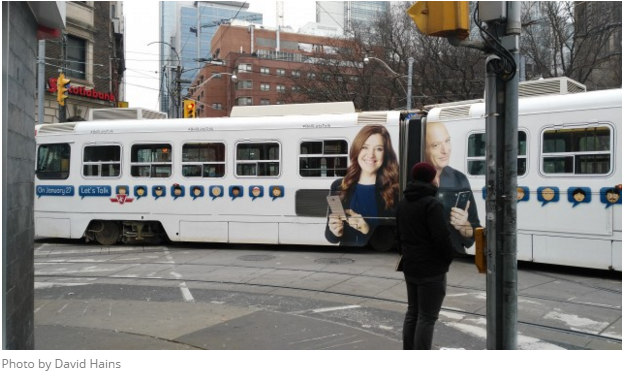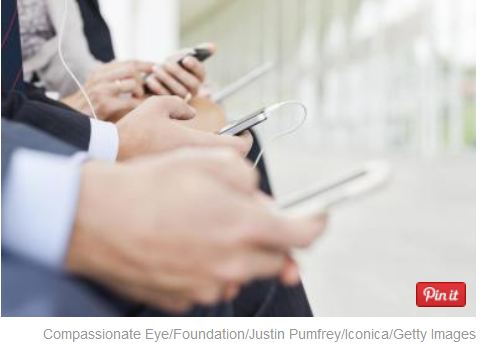A subway poster reads: “On January 27, let’s turn [sad face emoji] into [happy face emoji],”—a catchy slogan, but one that simplifies the complexities of mental illness. It’s an ad for Bell Let’s Talk Day, a campaign that seeks to end the stigma around mental health and donate money for the cause.
The campaign, which began in 2011, has raised more than $100 million for various research institutes, hospitals, and organizations. It’s a simple and effective concept: For every phone call and text made on the Bell network and for every Bell Let’s Talk hashtag used that day, the company will donate five cents to the cause.
Since the campaign’s inception, Bell has received praise for being one of few major Canadian corporations to start conversations about mental health. But for some mental health advocates in Toronto, Let’s Talk Day has not been enough.
With its simplistic focus on mental illness, detractors claim that Bell has failed to look at the bigger picture.
That’s where the Toronto-based Psychiatric Disabilities Anti-Violence Coalition (PDAC) has stepped in.
Also founded in 2011, PDAC has spent the past four years researching and developing a framework to address the systemic violence often faced by those with psychiatric disabilities. The coalition was formed in response to a number of violent assaults against people with psychiatric disabilities that occurred between January 4 and April 5, 2011 in Parkdale. In December 2015, the group released a 44-page report outlining how to examine, analyze, and respond to such violence in the community.
People with mental illness also disproportionately experience poverty and homelessness, according to research by the Canadian Mental Health Association. With limited access to affordable housing and stigma around mental illness in the workplace, the violence they experience is institutional. These systemic injustices are what drove PDAC to further research the issue.
But Bell’s campaign, critics say, has seldom focused on these issues. “Bell is a huge corporate organization interested in making profit,” says Lucy Costa, a systemic advocate at the Empowerment Council, an organization champions clients and ex-clients of mental health services. She also who worked on the PDAC psychiatric survivor anti-violence framework.
“This is a profoundly different agenda than trying to make sense and meaning of the impact of poverty, isolation, disconnection—including digital disconnection—that so many experience when outcast from the social world due to prejudice.”
Poverty, in particular, is one component that Bell Let’s Talk Day hasn’t sufficiently addressed, argues Danielle Landry, an instructor at the School of Disability Studies at Ryerson University and a member of the working subcommittee on the PDAC anti-violence framework report.
When asked what Let’s Talk is doing to address poverty and mental illness, a media relations representative for Bell pointed to The Community Fund, an annual $1-million program that funds grassroots organizations. It has funded GTA organizations, such as the Parkdale Activity and Recreation Centre, which offers mental health services for the homeless, and Nexus Youth Service, which provides free drop-in counselling.
Still, the faces of the Let’s Talk campaign are predominantly wealthy white folks with successful recovery stories, Landry says—erasing the narratives of people of colour and those in poverty who may experience mental illness.
“We always get this particular kind of recovery narrative or overcoming narrative,” Landry says. “But how do everyday mad folks live up to those?”
And the celebrity names behind Bell’s campaign—think Howie Mandel and Clara Hughes—are similarly homogeneous. “[The spokespeople] are articulate and polished and clean and white,” Costa adds.
While these spokespeople certainly don’t reflect the diversity of those who experience psychiatric disabilities, their famous faces have propelled the campaign to huge audiences. They have also helped fund Bell’s grants for community advocacy, ranging from $5,000 to $25,000. Sadly, these grants are short lived—those who received grants in 2015 cannot reapply for a grant until 2017, which can stifle projects relying on their funding.
“Unpacking an issue like the everyday forms of violence experienced by people with psychiatric disabilities, especially across a coalition of community partners, takes time,” Landry says.
Until Bell better represents those affected by mental health, Landry and Costa point to organizations, such as the Empowerment Council, who employ the framework they’ve created for better visibility. Eventually, they hope, those simplistic Let’s Talk Day posters will be replaced with more in-depth, intersectional conversations about mental health.
Read the full post in TorontoIST










